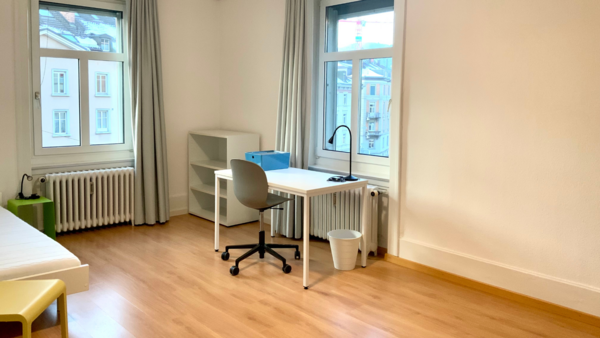![[Translate to english:] [Translate to english:]](/fileadmin/_processed_/5/8/csm_Jahresveranstaltung_Hochschulbildung_01_bea605eede.png)
Cooperation partnerships Higher Education
Cooperation partnerships are one of the Erasmus+ project formats. They make it possible for institutions of school education, vocational training, Higher education, adult education and extracurricular youth work to cooperate with partner institutions from Europe. Knowledge and experiences are exchanged and innovative approaches to education are developed in international networks. This in turn also benefits the Swiss educational landscape.
What are the aims of Cooperation partnerships?
The institutions involved work together to develop innovative concepts, methods and instruments, and to exchange information about proven methods and tap into synergies. This contributes to quality development of offerings and helps to strengthen international networks.
Cooperation partnerships contribute to one or more transversal or sector-specific political priorities of the European Erasmus+ programme (see Erasmus+ Programme Guide). For example, they are working on making mobility and cooperation activities more inclusive or developing innovative learning and teaching methods in the area of entrepreneurial skills.
How long does a Cooperation partnership project last?
Projects can last between 12 and a maximum of 36 months depending on the objectives of the project and the planned activities. This applies for all areas of education as well as extracurricular youth work.
Who can take part?
Educational institutions, non-profit organisations/NGOs, clubs, public authorities or cultural institutions may take part in cooperation partnerships.
In general, cooperation partnerships aim to establish close cooperation between institutions in Erasmus+ programme countries. A cooperation partnership must include three organisations from three Erasmus+ programme countries.
Swiss institutions are excluded from project management. Institutions based in Switzerland have two possibilities to be involved in partnerships: either as a full partner, or as an associate partner. In both variants, the added value of the cooperation with the Swiss institution for the project must be clearly emphasised in the application. See “Submit an application” in the right-hand column.
How are Swiss institutions supported financially?
Swiss institutions that are involved as full partners are financed as part of the Erasmus+ project. Swiss institutions that are involved in an Erasmus+ project as an associate partner can apply for funding from the Swiss Programme for Erasmus+. From 2023 onwards, funding will be based on five predefined funding contributions:
1. CHF 15'000
2. CHF 30,000
3. CHF 60,000
4. CHF 100,000
5. CHF 150,000
These contributions can cover a maximum of 60% of the total project costs. The institutions taking part must therefore provide at least 40% of the total project funding from their own resources or from other sources. The project cannot already be funded by grants from the Erasmus+ programme or the Internalional Programme.
The requested contribution must be proportionate to the planned tasks/activities of the Swiss institution and the EU funding contribution to the official partners.
Lead a cooperation project yourself?
International cooperation projects with partner institutions worldwide can also be funded through the International Programme. These projects are usually smaller than Erasmus+ projects, but the project is lead by the Swiss institution.
Forward-looking projects
Forward-looking projects are large-scale projects that aim to identify, develop, test and/or evaluate innovative (policy) approaches that have the potential to become mainstream and thus improve education and training systems. The three 2023 lots are digital education, vocational education and training (VET) and adult education.
Preparatory visits
Preparatory visits enable members of educational institutions to prepare cooperation projects. The support can be used to visit prospective partner organisations prior to a proposal submission, to establish contacts for joint projects and to initiate projects with partners.
More information is available here.
Application deadline
For School education, Vocational education and training, Higher education, Adult education and Youth Work:
Swiss applications to Movetia must be submitted in parallel with the corresponding Erasmus+ application, i.e. in the same application round of the same year.
2nd deadline
EU submission deadline: 1st October 2024
Movetia submission deadline: 15th October 2024
Documents
-
.pdf533 KB
-
.pdf3 MB
-
.pdf6 MB
Good Practice
-
.pdf187 KB
Similar Programmes
Contact
E-Mail
+41 31 303 22 04

![[Translate to english:] [Translate to english:]](/fileadmin/_processed_/0/2/csm_COIL_Foto_Praxis_und_Wissen_f9afa8ef05.jpg)

![[Translate to english:] [Translate to english:]](/fileadmin/_processed_/8/0/csm_Semp_Space_065ec993af.jpg)